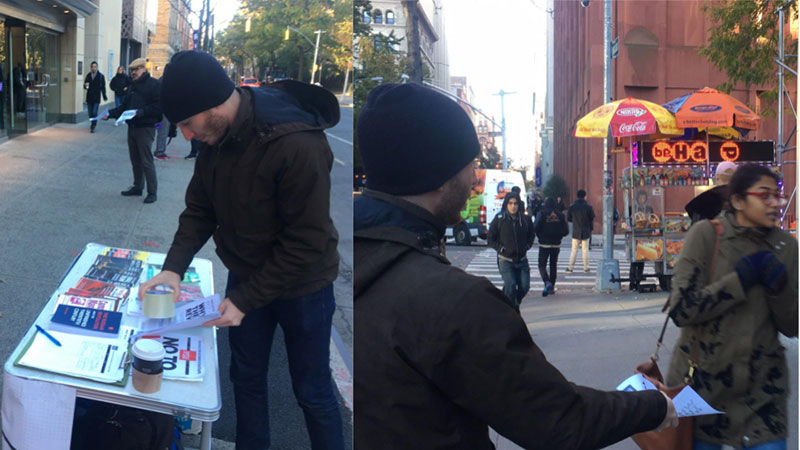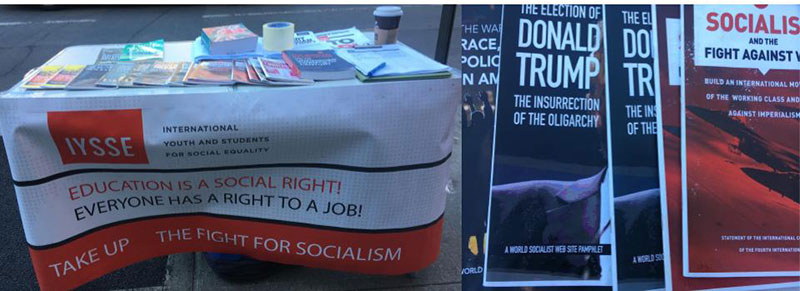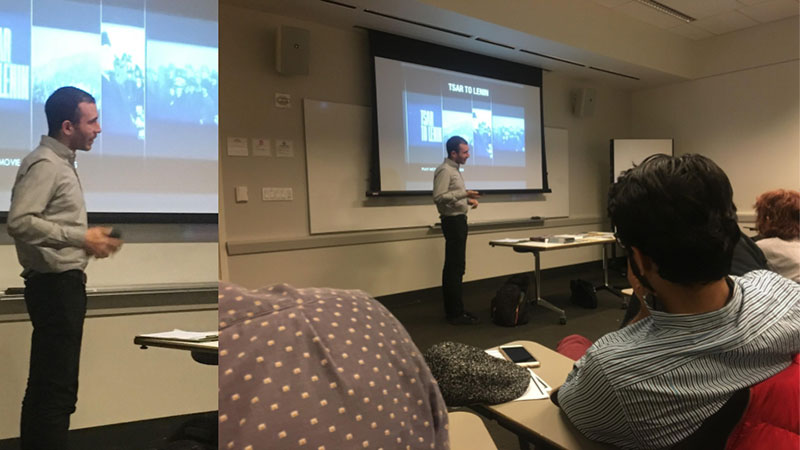By Joshua Jones
December 4, 2017

It’s early November, yet New York already feels like it’s freezing. The day is cloudy, the sun only appearing in brief instances before going back to being obscured. It is the kind of day one would be tempted to spend inside, and yet, Isaac Oseas is outside, handing flyers to passersby who rarely even look his way. Protected from the cold by a dark blue cap and a layered brown winter coat, Oseas braces the conditions for a higher cause: activism.

Isaac Oseas and his fellow members of International Youth and Students Striving for Social Equality, or IYSSE, stand in front of the Helen and Martin Kimmel Center for University Life. They have a table set up, decorated with a banner proclaiming “Education is a social right! Everyone has a right to a job! Take up the fight for socialism!” On top of the table is their assortment of literature, including books about the Russian revolution, booklets on the election of Donald Trump or anti-war efforts, books written by Leon Trotsky, and inevitably, Karl Marx’s Communist Manifesto. Adjacent to the literature is a sheet for those who want to be added to their mailing list.

New York City is the hub of all forms of marketing, from the grandiose electronic displays in Times Square to the analog self promotion of handing out materials to pedestrians. If you are on the New York University campus, their flyers are virtually inescapable to those not buried in their phones. Promoting events with titles like “Why is Google Censoring Left-Wing Websites” or “Why Study The Russian Revolution,” the posters are plastered all over campus. On the corner of University and West 4th street, one can simultaneously notice three flyers on three separate light poles. All are covered completely with tape in an effort to stop either the wind or assorted vandals from easily taking the flyers down from their lucrative position.
Who is the man or woman who dedicates time to go out with a roll of Scotch tape and place these flyers all around Greenwich Village? And why would someone subject himself to standing outside in the awful conditions of New York weather? It must be something the individual deems so important that they must divert time away from their jobs, their studies, or their families to address or to promote it.

Pictured (left to right): Poster of event hosted by IYSSE, poster of an IYSSE event that has been torn, poster of another event which has been vandalized by a competing socialist organization.
Isaac Oseas is one of these activists. As the president of NYU’s chapter of IYSSE, he is very familiar with the organization’s methods. And as both a graduate student of Near Eastern studies and a member of the Student Senate, he is definitely not someone with an overabundance of spare time. However, one can’t doubt his dedication to the cause. He carries promotional materials for IYSSE events with him in his bag, will offer to forward links to literature to anyone interested, and successfully ran for the graduate student seat in the CAS Senate specifically advocating IYSSE’s anti-war, pro-worker platform.
Oseas is both similar and different to what one would expect of a political activist. Like most activists, Oseas fervently campaigns for his cause. Beyond advocating his platform on NYU’s campus, he travels to working class neighborhoods to speak with the residents about their problems. However, unlike what one might think of an activist, he is mostly soft-spoken and calm. After an IYSSE hosted screening of the documentary “Tsar to Lenin,” a woman in the crowd began disrupting the event, claiming the attendees were a part of a “New World Order” conspiracy and referencing anti-semitic conspiracies about the Russian Revolution. Oseas calmly asked the woman to leave and explained to the audience the problems with her statements.

2017 is a notable year for the socialist organization. Despite being the year where a billionaire real estate mogul was inducted into the highest office in the United States, 2017 marks the 100th anniversary of the Russian revolution and IYSSE hosted two events to commemorate the anniversary. “Whatever attitude one has toward the Russian Revolution, there is no doubt that it changed the entire course of the 20th century,” Oseas writes in an op-ed for the Washington Square News, NYU’s student newspaper. “The conditions that preceded this monumental event remain with us to this day.”
What initially got him involved? Oseas joined IYSSE as an undergraduate at the New School. A combination of political reading and the election of Barack Obama spurred his interest in political advocacy. He got involved with International Students for Social Equality, IYSSE’s predecessor, both groups being founded as student chapters of the Socialist Equality Party. The ISSE stood out to Oseas as it was one of the few left-leaning organizations openly criticizing Obama, who they did not view as an viable alternative to the current political climate.
As a chapter of the Socialist Equality Party, IYSSE supports neither Republicans or Democrats. Coming off the heels of the 2016 election, one would think there would be an increased sense of urgency within IYSSE. “Not really,” Oseas responds. He goes on to explain that Democrats are ultimately controlled by the same forces as Republicans. As much as Oseas despised Trump, he couldn’t support Clinton or the Democrats. Trump is an issue, but the Democrat’s motivation to impeach isn’t helping. “Democrats are now looking towards the CIA, one of the most undemocratic forces,” he says. The Socialist Equality Party ran their own candidate: Jerry White, an editor of the World Socialist Web Site. “It took a lot of consideration, but I did vote for Jerry White” Oseas admits.
IYSSE is in its first year at New York University. The club had been denied for two semesters in a row before finally being admitted into NYU’s New Club in Development phase. For Oseas, this was a small victory. Now, that it nears club status, Oseas is determined to spread its anti-war message to the students.

Before handing out flyers in front of the Kimmel center, Oseas goes into the basement of NYU’s Bobst Library to hang some on the cluttered corkboard among flyers for tutors, classes, student projects, and the events of other groups. He suddenly meets a familiar face, another student at NYU. The man, dressed in a full suit, asked to not be photographed. “No politics for me,” he says. “I’m a behind the scenes kind of guy.”
Oseas and the man catch up before he invites him to the panel on the Russian revolution’s significance. “We’re having an event this week. You should come.” he says.
“Oh, yeah. I’ll be there,” the man responds.
Oseas leaves the library and heads for the front of the Kimmel center. He approaches the table, moves over the giant roll of tape being used to hold down the paper from the wind, and grabs the posters. One of his fellow members tell that there will be a table open soon. He stands outside, telling people his message, waiting for a table on the inside.